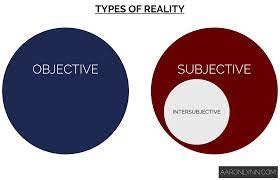While reading Sapiens by Yuval Noah Harari, I was turned onto the idea of three levels of truth. Those being objective, subjective, and inter-subjective. The “realities” that we observe in our daily lives aren’t always as cut and dry as we believe them to be. Only an objective idea is a fundamental truth of the universe that holds regardless of whether you believe in it or not. Gravity is an example of an objective reality. You can deny its existence, you can claim it doesn’t affect you, you can make up any reason to discredit it, but at the end of the day if you jump, gravity will always pull you back down. There is no negotiating with it. As Aldous Huxley once said, “facts do not cease to exist because they are ignored.” That is the best frame of thought when addressing objective truths.
Beliefs that are subjective are those that you develop for yourself. These are your set of core principles and values that you believe in. However, they are not grounded by any scientific basis. They are also not reliant on other people believing in them. They solely belong to you and are what make you unique. An example of a subjective idea is believing that you should give someone a second chance after making a mistake. This is an idea that morally you believe in, but you will never be able to conduct an experiment to prove that your belief is more “right” than the person who has a strict zero tolerance policy. Since there is no universal truth when it comes to personal beliefs, that means it is up to the individual to develop a system for themselves. This is a critical step that many miss. Many people’s principles are grounded in what they were told growing up by family, friends, and teachers. More internal examination is required. Otherwise, we will all become clones of those who have mentorship roles in society. We will lose our individuality if we don’t make an extra effort to discover what we believe in. You can either live with the beliefs that someone else ingrained in you, or you can work to unlock who you truly are. The choice is up to you.
Finally, inter-subjective beliefs are those that were created by societies as a way of establishing structure and order. These are commonly referred to as social constructs. Religions, laws, constitutions, nations, etc., are all examples of inter-subjective beliefs. They don’t actually exist in nature, but the common belief in them by millions of individuals make them as undeniable as an objective truth. Only a revolution can dismantle the strongest inter-subjective beliefs. The U.S. Legal System is one example. Nowhere in nature does it say that the laws that govern the U.S. are the natural laws that should govern human beings. They didn’t exist until they were written into being over the past few centuries. Every other nation in history has been governed by a different set of rules. What is undeniable to someone living in the United States has little meaning to someone in Europe. At the same time, these inter-subjective beliefs are what give a group of people their power. They serve a purpose. They are something to bond over and rally behind. More examples include capitalism vs. communism, monarchy vs. republic, states’ rights vs. totalitarianism. The list goes on. Communities are all backed by their own unique systems that are a tangible reality for those living in it yet hold zero substance for those who are removed from it.
To bring everything full circle, I think these three levels of truth are a helpful tool to analyze what you hold to be true. When you are in doubt over a particular idea ask yourself: Do I believe this because it is a fundamental truth of the universe, because the society around me was built around it, or because I have done my own research into the subject and determined for myself that this is what I believe in, regardless of if other’s support my belief? If the answer is none of the above, then it is likely a belief that was instilled into you by others. These are your imposter thoughts. Identify them and if they don’t align with your core values after examination, remove them. Purge yourself of all the subjective beliefs that don’t agree with who you are. This will grant you the ability to view the world through a lens of authenticity.
Thanks for reading! Like, share, and subscribe for more!
Thomas



